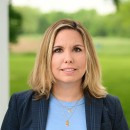Research Office News
Pages
 Stimulus Checks Might Not Reach Those Who Need Them Most
Stimulus Checks Might Not Reach Those Who Need Them MostAssociate Professor Terri Friedline discusses financial system reform and consumer protections to ensure that people and communities have access to safe and affordable financial products and services during the Coronavirus Pandemic.
- April 9, 2020
- Learn more »
 Addie Weaver’s Research Offers Rural Residents Virtual Treatment for Depression During Pandemic
Addie Weaver’s Research Offers Rural Residents Virtual Treatment for Depression During PandemicAssistant Professor Addie Weaver recently started a pilot program to increase access to depression treatment in rural communities, which often lack mental health professionals, as part of her National Institute of Mental Health-funded Career Development Award. She collaborated with pastors and human service providers from Hillsdale, Michigan to develop an evidence-based, computer-assisted depression treatment program, Raising Our Spirits Together. The computer-assisted program, based on cognitive behavioral therapy, was designed to be delivered in small groups in rural churches, with local pastors serving as facilitators.
As the project was launching, Governor Gretchen Whitmer ordered a “Stay Home, Stay Safe” order to fight the spread of the coronavirus. It was no longer feasible to meet in person for small group sessions at the church. Weaver and her partners had already identified a group of people who needed depression treatment and were concerned about their symptoms worsening due to the additional stresses of social distancing and isolation.
After talking with the pastors and group members, Weaver and her research team retooled the treatment program and now offer Raising Our Spirits Together remotely. Weaver, the pastors, and group members gather online once a week to complete the treatment program. Group members have shared how meaningful it is to continue treatment, stay connected with one another, and to learn new skills and tools to help them manage their depression during this difficult time.
Team members include Associate Dean for Faculty Affairs and Howard V. Brabson Collegiate Professor of Social Work Joseph Himle, Professor Andrew Grogan-Kaylor, Project Coordinator Caroline Landry, Community Research Coordinator Jeffery Johnson, and MSW student Trevor Buys.
By developing solutions during this rapidly changing time, Weaver and her team are providing crucial mental health support to rural community members.
- April 9, 2020

 COVID-19 Causing Increased Conflict Between Parents and Children
COVID-19 Causing Increased Conflict Between Parents and ChildrenAssociate Professor and Director of the Parenting in Context Research Lab, Shawna Lee, says parents throughout the country have encountered unprecedented challenges in the midst of the pandemic. The results help to illustrate how Coronavirus is impacting parenting and how adults are coping with Coronavirus. The report highlights an increase in shouting, yelling or screaming at children in the past two weeks. In addition, during that same timeframe, one in six parents spanked or slapped their child. “For a large number of parents, financial concerns, other worries, social isolation, loneliness and sadness are getting in the way of parenting,” said Lee. The report, co-authored by social work doctoral student Kaitlin Ward, examines how parents have responded to their children during the pandemic.
More states are announcing closings for the duration of the school year. Familiar sources of support, such as teachers and school counselors, will no longer be able to look after the health and wellbeing of vulnerable children. The American Academy of Pediatrics recommendation parents avoid physical punishment. Other evidence-based recommendations are below.
- March 31, 2020
- Learn more »
 Terri Friedline’s Research Informs the Automatic BOOST to Communities Act
Terri Friedline’s Research Informs the Automatic BOOST to Communities ActAssociate Professor Terri Friedline’s research, “Mapping Financial Opportunity” can be used to inform the Automatic BOOST to Communities Act drafted by Rashida Tlaib, U.S. Representative for Michigan's 13th congressional district. In response to the coronavirus crisis, the proposed legislation would immediately provide a U.S. debit card preloaded with $2,000 to every person in America, which could be transitioned into a universal federal or postal banking account. Each card would be recharged with $1,000 monthly until one year after the end of the coronavirus crisis. Friedline's research focuses on universal bank account access and she maps post office locations to inform the potential for postal banking.
- March 23, 2020
 Luke Shaefer Discusses How Low-Income Families have Fewer Options During COVID-19
Luke Shaefer Discusses How Low-Income Families have Fewer Options During COVID-19Professor Luke Shaefer is quoted in a New York Times article detailing how low-income families often bear the brunt of the pain in natural disasters and large-scale emergencies. “They tend to be the first hit when things go wrong and then also to take the longest time to recover.”
- March 20, 2020
 Lisa Wexler Discusses Suicide Prevention in Remote Alaskan Communities
Lisa Wexler Discusses Suicide Prevention in Remote Alaskan CommunitiesAlaska Public Media interviewed Professor Lisa Wexler about her work with a new suicide prevention model titled Promoting Community Conversations About Research to End Suicide. The program is a community health intervention designed, supported and implemented by remote communities in Northwest Alaska to decrease suicide. “The whole process is all about self-determination and about people deciding for themselves what they want to do and how they want to do it,” Wexler said.
- March 11, 2020
- Learn more »
 New Video Highlights Todd Herrenkohl’s Research on Stress and Adversity Faced by Children
New Video Highlights Todd Herrenkohl’s Research on Stress and Adversity Faced by ChildrenWhen children experience stress and adversity in their homes and communities, schools become a critically important setting in which to intervene and foster their resilience. Marion Elizabeth Blue Professor of Children and Families Todd Herrenkohl has collaborated on a video to help school professionals understand and better educate vulnerable and traumatized students.
- February 25, 2020
- Learn more »
- Ahead Magazine Focusing on Social Work Research
Ahead (Issue 4) - In-depth views of social work research at the University of Michigan. This issue includes:
- New Vivian A. and James L. Curtis School of Social Work Center for Health Equity Research and Training
- Program Evaluation Group
- Remember Deborah Bybee
- February 20, 2020
 Luke Shaefer's New Research Reveals Stark Disparities in Rural Communities
Luke Shaefer's New Research Reveals Stark Disparities in Rural CommunitiesWhere are the nation’s most disadvantaged communities? With funding from the Robert Wood Johnson Foundation, Professor Luke Shaefer, a team of researchers from U-M Poverty Solutions and Princeton University explored this question and developed an Index of Deep Disadvantage to identify and better understand America’s most disadvantaged communities. By identifying communities of deep disadvantage can help direct resources where they’re most needed.
- February 14, 2020
- Learn more »
 Brad Zeback's Research on Psychosocial Care of Young Adults with Cancer Cited in NY Times
Brad Zeback's Research on Psychosocial Care of Young Adults with Cancer Cited in NY TimesProfessor Brad Zebrack’s research was cited in the New York Times, “When the Teenager or Young Adult Has Cancer.” His research reviews psychosocial challenges, support interventions and makes recommendations for young adults with cancer.
- February 7, 2020
- Learn more »